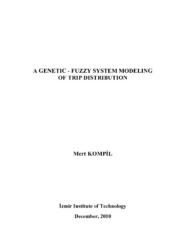Please use this identifier to cite or link to this item:
https://hdl.handle.net/11147/2883Full metadata record
| DC Field | Value | Language |
|---|---|---|
| dc.contributor.advisor | Çelik, Hüseyin Murat | en |
| dc.contributor.author | Kompil, Mert | - |
| dc.date.accessioned | 2014-07-22T13:48:32Z | - |
| dc.date.available | 2014-07-22T13:48:32Z | - |
| dc.date.issued | 2010 | en |
| dc.identifier.uri | http://hdl.handle.net/11147/2883 | - |
| dc.description | Thesis (Doctoral)--Izmir Institute of Technology, City and Regional Planning, Izmir, 2010 | en |
| dc.description | Includes bibliographical references (leaves: 89-96) | en |
| dc.description | Text in English; Abstract: Turkish and English | en |
| dc.description | ix, 141 leaves | en |
| dc.description.abstract | Trip distribution modelling is one of the most active parts of travel demand analysis. In recent years, use of soft computing techniques has introduced effective modelling approaches to the trip distribution problem. Fuzzy Rule-Based System (FRBS) and Genetic Fuzzy Rule-Based System (GFRBS: fuzzy system improved by a knowledge base learning process with genetic algorithms) modelling of trip distribution are two of these new approaches. However, much of the potential of these techniques has not been demonstrated so far. The present study explores the potential capabilities of these approaches in an urban trip distribution problem with some new features. For this purpose, a simple FRBS and a novel GFRBS were designed to model Istanbul intra-city passenger flows. Subsequently, their accuracy, applicability, and generalizability characteristics were evaluated against the well-known gravity and neural networks based trip distribution models. The overall results show that: i) traditional doubly constrained gravity models are still simple and efficient; ii) neural networks may not show expected performance when they are forced to satisfy production-attraction constraints; iii) simply-designed FRBSs, learning from observations and expertise, are both interpretable and efficient in forecasting trip interchanges even if the data is large and noisy; and iv) use of genetic algorithms in fuzzy rule base learning considerably increases modelling performance, although it brings additional computation costs. | en |
| dc.language.iso | en | en_US |
| dc.publisher | Izmir Institute of Technology | en |
| dc.rights | info:eu-repo/semantics/openAccess | en_US |
| dc.subject.lcsh | Trip generation | en |
| dc.subject.lcsh | Traffic estimation--Mathematical models | en |
| dc.subject.lcsh | Fuzzy systems | en |
| dc.title | A genetic-fuzzy system modeling of trip distribution | en_US |
| dc.type | Doctoral Thesis | en_US |
| dc.department | Thesis (Doctoral)--İzmir Institute of Technology, City and Regional Planning | en_US |
| dc.relation.publicationcategory | Tez | en_US |
| item.languageiso639-1 | en | - |
| item.fulltext | With Fulltext | - |
| item.openairecristype | http://purl.org/coar/resource_type/c_18cf | - |
| item.openairetype | Doctoral Thesis | - |
| item.grantfulltext | open | - |
| item.cerifentitytype | Publications | - |
| Appears in Collections: | Phd Degree / Doktora | |
Files in This Item:
| File | Description | Size | Format | |
|---|---|---|---|---|
| T000883.pdf | DoctoralThesis | 2.49 MB | Adobe PDF |  View/Open |
CORE Recommender
Page view(s)
144
checked on Jul 22, 2024
Download(s)
112
checked on Jul 22, 2024
Google ScholarTM
Check
Items in GCRIS Repository are protected by copyright, with all rights reserved, unless otherwise indicated.